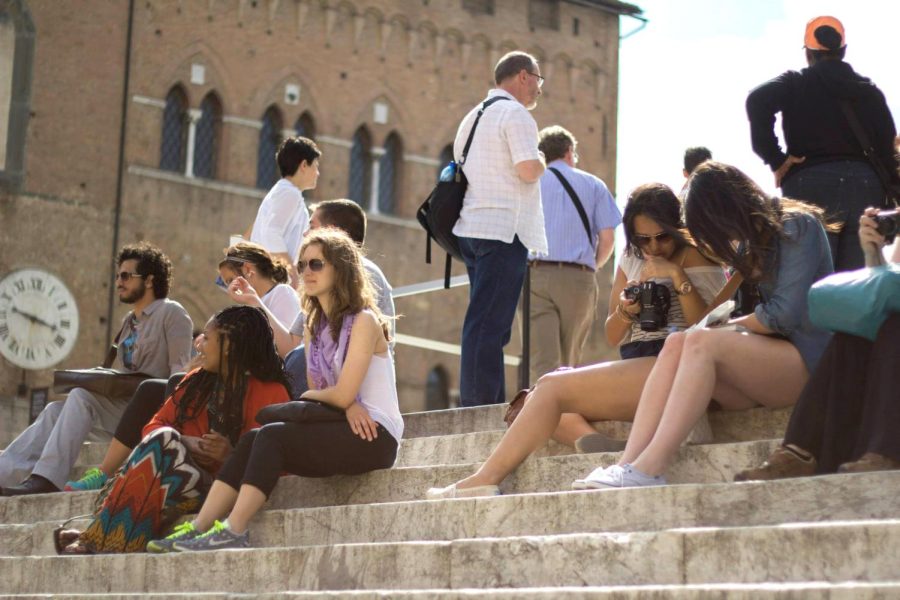Students get creative to fund study abroad trips
Kent State students sit on steps in Siena, Italy, during an excursion led by Associate Professor of art Gus Medicus in summer 2014.
November 16, 2016
Studying abroad has the potential to be a life-changing experience, but many students write it off as an impossibility because of the price. There are, however, many ways that students can offset the costs of studying in another country.
With study abroad trips set for Ireland, Ghana, Italy and other locations in the coming semesters, many students will be scrambling to save money to fund their adventures.
The cost of housing can be very different from the cost of dorms at the main campus. Meal plans can vary in price and students will need to purchase passports when attending classes out of the country and pay for airfare. Depending on the country and length of stay, a visa may be required as well.
The common routes taken to pay for education abroad are financial aid and scholarships, such as the $5,000 Denise Rhea-Adams Scholarship for art students and the $100-$2,500 Fiedler-BorgWarner International Development Scholarship for business students. The Student Financial Aid Office has a list of education abroad scholarships on their website.
There are, however, many unconventional ways that students can save money to pay for education abroad trips. Many students send letters to their extended families asking for assistance. Some students put on bake sales. There have even been students who paid for Education Abroad with money raised from GoFundMe campaigns.
“Coming up with ideas may not be easy, but it is inherent — especially when you want to save money. I made a list, looked online and brainstormed,” said Kevin Heller, a senior conservation major.
Heller was able to pay for his Education Abroad trip to Costa Rica over winter break in 2015 using extra money he obtained from selling his car. He now works as a peer ambassador for the College of Arts and Sciences’ Education Abroad.
“I got enough extra money to be able to pay the affordable program fee,” Heller said. “It was worth it because I felt I finally did something for me. It was daring. It was risky, but it was fully worth it to have the experience of a lifetime.”
Heller also stressed the importance of working as a team with other students attending the same trip as you.
“Work together. If you have a mutual trip with others, get together and fundraise,” Heller said. “Also, have fun when fundraising; use Pinterest and the available parts of life you have. Come visit us in our office and know that to study abroad, it is with any amount of work.”
While many education abroad programs cost more than students normally pay attending main campus, not all are that expensive.
“There really is a program that fits every budget,” said Nick Vasiloff, a senior education abroad advisor. “There are even some programs that are cheaper than attending the Kent Campus.”
The programs offered by Education Abroad range dramatically in length from one and two week programs over winter break to programs that will last a full academic year. There are also some summer programs that last roughly three months.
“The short term (programs) are the most popular,” Vasiloff said. “It’s kind of a national trend at the moment.”
While Kent State prides itself on the many different programs spanning many different majors, not every major is represented equally in education abroad. According to Vasiloff, certain programs don’t lend themselves to education abroad, such as some of the sciences.
Even students that may be part of one of these majors can take advantage of education abroad in their earlier college years, though. Kent State’s Florence program offers many lower level general education classes that all students need to graduate.
“Study abroad is more than an experience,” Heller said. “It is the soul transforming into a fountain of knowledge from which our existence flows.”
Nicholas Adkins is the student finance and jobs reporter, contact him at [email protected].

























